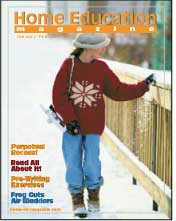
Home schooling is the most flexible and diverse educational option available today. The variety of home schooling styles reflects the diversity of the people who choose this method. Some families organize their home school the same as a traditional school, with the children studying the same subjects the same way as public school students. Some families use the opposite approach and "un-school" their children-a far less structured approach where the children’s schedule is determined by their interests and readiness. Most home schools, however, use an eclectic approach that is partly structured and partly interest-based. This method allows parents to pick and choose the classes and materials that meet their children’s needs. These may be college or co-op classes, pool teaching, charter schools, independent study programs, apprenticeships, volunteering, and a host of options. Home schooling is as unique as you are.
Home schooling is legal in all fifty states and throughout Canada. Home schooling is also becoming increasingly popular in Australia, New Zealand, England, and Japan. However, every state and province has its own laws regarding home schooling and some are more "friendly" than others. Some home schooling laws merely require you to let your local school district know that you will be home schooling your children. Some laws require you to fill out paperwork as if you were a private school. If you are considering home schooling, you will need to get information on the current laws in your area. State or local home school groups are often the best source of information. A member of a support group in your state can advise you on how to register as a home schooler in your state. It is NOT necessary to join a Legal Defense Fund. We also recommend become familiar with your state's home school law at http://www.nhen.org.
For many home schools, one of the greatest benefits of home schooling is the strengthening of family bonds. Home schooling families spend lots of time learning and playing together and this naturally creates close ties between brothers and sisters and between children and parents. Home schoolers also have a great deal of flexibility in how and what they learn, allowing them to learn about the "real world" by being part of it. These advantages allow home schooled children to receive a superior education that is attuned specifically to their own needs, learning style, personality, and interests.
According to home schools’ feedback on Homeschool.com, the biggest disadvantage facing the home schooling family is loss of income. Someone must be home, at least part-time, to facilitate the children’s learning. At a time when it can often be difficult to get by on two incomes, it can be a real challenge to get by on just one. Some of the other difficulties facing home schooling parents include lack of confidence in their own and their children’s abilities, public and/or family criticism, and adjusting career goals and work schedules to accommodate the needs of the family. One last challenge humorously cited by home schools is that of housekeeping. When you use your home full-time for home schooling (and in some cases even for work), things can get a bit messy. But don’t worry, those books piled high on the coffee table, the science experiment on the table, and the art project in the patio are all signs that your child is learning.
For many Pagan parents, home schooling provides a way to guarantee a comprehensive education in a non persecutorial atmosphere. Within this section we will be providing a list of resources for Pagans looking to examine the home schooling alternative.
Homeschoolers are accepted and recruited by some of the top universities in the country because of their maturity, independent thinking skills, creativity, and strong academic preparation. As previously mentioned, homeschoolers perform above average on the ACT. Success on the ACT test reveals that the courses taken by high school students to prepare for college have been effective. Homeschoolers also placed highest on the SAT college entrance exams in the year 2000. In addition to academic success, homeschoolers have had athletic success in college. Coaches are recruiting home schooled athletes, and in 2001 the National Collegiate Athletic Association (NCAA) declared about 100 home schooled students eligible for athletics as freshmen at major universities, up from 85 the year before. An article in Time on September 11, 2000, reported that 26 percent of 35 home schooled applicants had been accepted into Stanford University’s 2000-2001 freshman class. This is nearly double the rate of overall acceptance.
 Home
Education Magazine presents a unique home school perspective based on
years of experience. On this site you will find free online newsletters,
discussion boards, a networking list, and selections from the magazine,
including articles, interviews, columnists, resources, reviews and more!
Remember to bookmark your favorite pages at this site!
Home
Education Magazine presents a unique home school perspective based on
years of experience. On this site you will find free online newsletters,
discussion boards, a networking list, and selections from the magazine,
including articles, interviews, columnists, resources, reviews and more!
Remember to bookmark your favorite pages at this site!
Listings of resources reviewed or mentioned in the pages of Home Education Magazine
Jon's Home school Resources With over 140 distinct pages and over 1¾ meg of HTML text, this is one of the largest home schooling sites on the Web. This site's size and neutrality is why it remains one of the most popular home schooling sites on the Web, with a high Google rank, over fifteen hundred incoming links and five or six hundred visitors every day.
Home schooling at Homeschool.com - Your Virtual Home School Explore Homeschool.com and let us help you... from getting started home schooling to helping your young adult go out into the world!